Our Beekeeping Practices
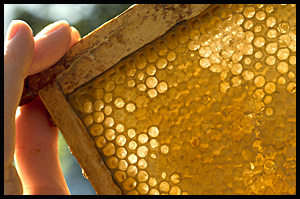 Here at Honey Grove, we keep bees because we love bees, and because we love what bees do for our gardens and our planet. We are also terribly concerned about the current decline of the honeybee. We want to do our part to keep bees healthy and thriving, for the benefit of bees, humanity and this good earth.
Here at Honey Grove, we keep bees because we love bees, and because we love what bees do for our gardens and our planet. We are also terribly concerned about the current decline of the honeybee. We want to do our part to keep bees healthy and thriving, for the benefit of bees, humanity and this good earth.
We are dedicated to providing our bees with the highest quality care. We use organic methods whenever possible and are devoted to the most holistic practices. As a small apiary we are able to concentrate our attentions on the needs of each individual hive. Once established, a hive stays in its designated garden and unlike commercial beekeepers we do not ship our bees out to pollinate mono-crops. Thousands of flowers are grown on Honey Grove throughout the year with the sole intention of creating abundant and varied forge for the bees. The aim is to create a landscape that can fully sustain its bee population. At the end of the honey harvest we leave our bees with as much honey as they will possibly need, this helps to avoid the supplemental feeding of sugar syrup. The best food for bees is, after all, honey.
We are also proud to say that we do not use antibiotics for disease prevention. It is now thought that colony collapse could very well be a result of many things, including the combination of mono-crop diets, pesticides, poor nutrition and poor disease management. Our approach to honeybee health is Integrated Pest Management, meaning we do a number of non-invasive practices throughout the beekeeping year to reduce the stress levels in the hive and to keep mite counts down.
Our Honey
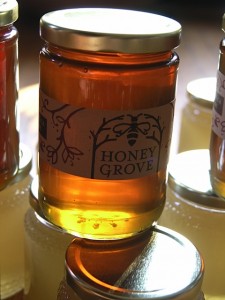 Honey Grove honey is a labour of love, on the part of the bees and the beekeepers. Most people do not know that it takes one bee her whole lifetime to create one teaspoon of honey. It has been said throughout the ages that honey is a holy substance, a sweet alchemy, a medicine, a magical elixir. It is the sweetness of summer distilled and infused with the essences of the bee and the flower.
Honey Grove honey is a labour of love, on the part of the bees and the beekeepers. Most people do not know that it takes one bee her whole lifetime to create one teaspoon of honey. It has been said throughout the ages that honey is a holy substance, a sweet alchemy, a medicine, a magical elixir. It is the sweetness of summer distilled and infused with the essences of the bee and the flower.
For Rudolph Stiener (Austrian philosopher and biodynamic agriculturist/ beekeeper) honey was the result of love; made manifest by the bee’s love affair with the flower, the unity of the masculine and feminine.“The whole beehive is permeated with life based on love. The bee lives as if it were in an atmosphere pervaded thoroughly by love. The bee sucks nourishment, which it makes into honey, from the parts of a plant that are steeped in love life.” (From the Book Bees, Lectures by Rudolf Stiener.)
Bee Forage
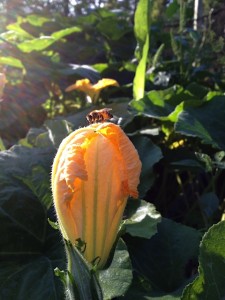 Thousands of flowers are grown on Honey Grove throughout the year with the sole intention of creating abundant and varied forge for our bees. Our aim is to create a landscape that can fully sustain its bee population. At the end of the honey harvest we leave our bees with as much honey as we can, this helps to avoid the supplemental feeding of sugar syrup. When we are required to feed sugar syrup, we enrich the syrup with herbal biodynamic tea blends that support the over-all health and wellness of our bees.
Thousands of flowers are grown on Honey Grove throughout the year with the sole intention of creating abundant and varied forge for our bees. Our aim is to create a landscape that can fully sustain its bee population. At the end of the honey harvest we leave our bees with as much honey as we can, this helps to avoid the supplemental feeding of sugar syrup. When we are required to feed sugar syrup, we enrich the syrup with herbal biodynamic tea blends that support the over-all health and wellness of our bees.
We hope you enjoy Honey Grove Honey as much as we do, and as you savour its sweetness, know that you are tasting the landscape from which it came. Recall that one bee spent her whole life gathering enough nectar to give you one spoonful of sweetness. Contemplate that this sweetness came for the nectar that rose up into the center of a flower, where it was ingested by a bee, and transformed into the sweet liquid gold that sits upon your tongue.
Education
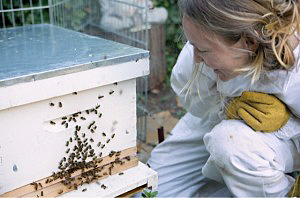 As many people are aware, honeybees worldwide are in trouble. The current decline of the honeybee population indicates that there is a great imbalance in the natural world. Ninety percent of plant life on earth requires pollination by insects to grow, fruit and reproduce. Honeybees play a vital and enormous role in pollination. “One of every three mouthfuls we eat, and of the beverages we drink, are delivered to us by pollinators, almost all of which are insects” (Dr. Edward O Wilson, Harvard University).
As many people are aware, honeybees worldwide are in trouble. The current decline of the honeybee population indicates that there is a great imbalance in the natural world. Ninety percent of plant life on earth requires pollination by insects to grow, fruit and reproduce. Honeybees play a vital and enormous role in pollination. “One of every three mouthfuls we eat, and of the beverages we drink, are delivered to us by pollinators, almost all of which are insects” (Dr. Edward O Wilson, Harvard University).
Hive tours and educational talks are available upon request.
Beeyard Tours
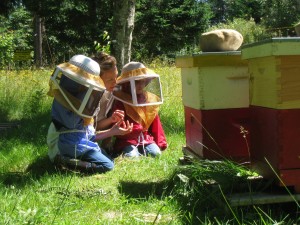 A beeyard tour is a wonderful way to learn about honeybees. Providing it is a warm sunny day, you will get to observe the bees in their natural surroundings gathering nectar from the garden flowers. During this time Nao will talk about the honeybee lifecycle, the mysterious inner workings of the beehive, and the environmental challenges that our bees are facing today. Beeyard tours are approximately 45 minutes long. The cost is $20 per person (Minimum of 2 people/ Maximum 6). Apiary tours are weather dependent.
A beeyard tour is a wonderful way to learn about honeybees. Providing it is a warm sunny day, you will get to observe the bees in their natural surroundings gathering nectar from the garden flowers. During this time Nao will talk about the honeybee lifecycle, the mysterious inner workings of the beehive, and the environmental challenges that our bees are facing today. Beeyard tours are approximately 45 minutes long. The cost is $20 per person (Minimum of 2 people/ Maximum 6). Apiary tours are weather dependent.
Honey Tasting
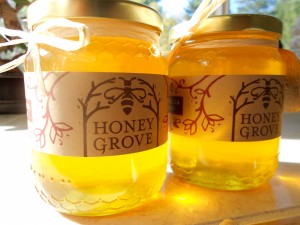 When we taste honey, we taste the essence of the landscape from which it came. The sweetness,colour and texture will vary depending on which blossoms the bees visited and the nectar collected. Honey flavours are as varied as wine. Each honey has it’s own unique character. Some honeys are subtle, others are robust, some can be described as a clear single note, and others are a symphony of flavor. When you join Nao for a honey tasting you will explore the landscape of Honey Grove through taste. You will also have an opportunity to taste honeys from other parts of the world for comparison. The Cost is $20 per person. ( Minium of 2, Maximum 10). Please contact Nao to arrange date and time.
When we taste honey, we taste the essence of the landscape from which it came. The sweetness,colour and texture will vary depending on which blossoms the bees visited and the nectar collected. Honey flavours are as varied as wine. Each honey has it’s own unique character. Some honeys are subtle, others are robust, some can be described as a clear single note, and others are a symphony of flavor. When you join Nao for a honey tasting you will explore the landscape of Honey Grove through taste. You will also have an opportunity to taste honeys from other parts of the world for comparison. The Cost is $20 per person. ( Minium of 2, Maximum 10). Please contact Nao to arrange date and time.
“A bee takes her nourishment from the parts of a plant that are steeped in love. In this way, the bee brings the love from the flowers into the beehive…”~ Rudolph Steiner